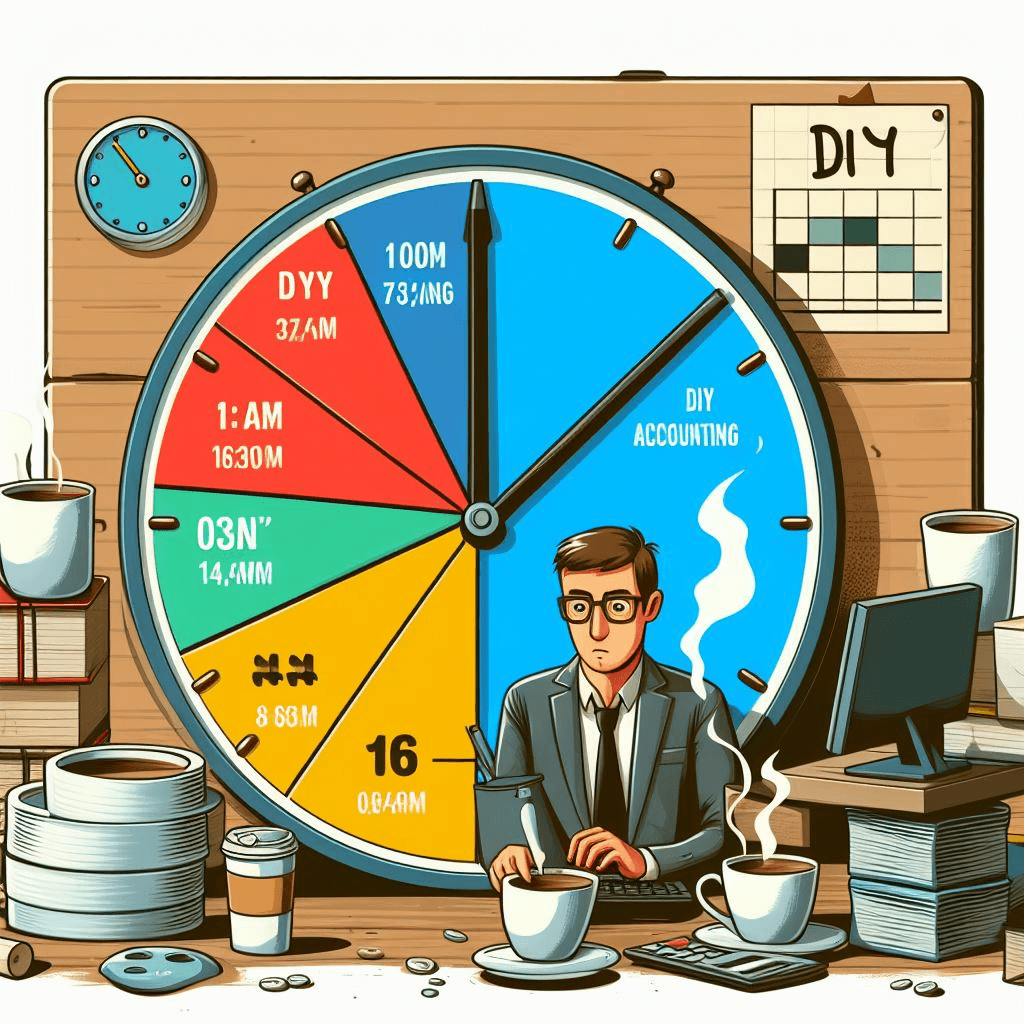Running a successful small business requires a firm grasp of your finances. Accurate accounting and bookkeeping are the cornerstones of this financial understanding. They provide a crystal clear picture of your income, expenses, and overall financial health. This transparency empowers you to make informed decisions about your business, identify areas for growth, and track progress towards your goals.
In today's tech-savvy world, many small business owners are taking on accounting tasks themselves, a trend known as 'DIY accounting.' While this approach might seem like a way to cut costs, it can lead to significant dangers for your business.
The 6 Dangers of DIY Accounting
A. Inaccurate Records and Missed Deadlines
Bookkeeping, at its core, is about meticulous record-keeping. Every transaction, every penny in and out, needs to be documented accurately. Unfortunately, even a single mistake can have a cascading effect.
Imagine a typo in a sales figure. This seemingly small error can throw off your entire financial picture. Now imagine several of these mistakes going unnoticed – a missed expense here, a misplaced receipt there. Soon, your financial statements become unreliable, and the information they provide is no longer trustworthy.

This lack of accuracy can lead to a domino effect of negative consequences. Poor financial decisions are a prime example. Without a clear understanding of your true financial standing, you might invest in the wrong areas, overspend, or miss opportunities for growth.
Another major danger is missing tax deadlines. Bookkeeping plays a crucial role in ensuring you have the necessary information to file your taxes accurately and on time. Errors in your books can translate to missed deductions, potentially costing you the money you deserve to claim. Even worse, inaccurate filings can trigger penalties and audits from tax authorities, causing significant stress and financial hardship.
B. Lack of Expertise
The world of accounting is full of complexities. Accounting principles dictate how various transactions are recorded and categorized. Tax regulations, on the other hand, are constantly evolving with new rules and updates. As a small business owner, navigating this intricate landscape can be challenging, especially without a strong foundation in these areas.
Trying to DIY accounting opens the door to several risks. Misclassifying transactions is a common pitfall. For instance, an expense might be mistakenly recorded as an asset, leading to a distorted view of your financial health. Additionally, overlooking legitimate tax deductions can significantly increase your tax burden.

Deductions are available for a variety of business expenses, but without the proper knowledge, you might miss out on these valuable opportunities to save money.
Perhaps the most serious risk associated with a lack of expertise is non-compliance with filing requirements. Failing to meet these requirements can trigger penalties, interest charges, and even legal trouble. A professional accountant stays up-to-date on the latest regulations and ensures your business remains compliant, saving you from these potential headaches.
C. Time Drain
Bookkeeping, while essential, can be incredibly time-consuming. It involves diligently recording transactions, reconciling accounts, generating reports, and staying on top of deadlines. For a busy small business owner, these tasks can easily eat into valuable time that could be better spent focusing on core business activities. Imagine the hours you could dedicate to developing new products, securing new clients, or strategizing for growth if you weren't bogged down with bookkeeping.

The time spent on DIY accounting also comes with an opportunity cost. Every hour you spend crunching numbers is an hour you're not spending on activities that directly generate revenue or propel your business forward. Hiring a professional accountant frees up your time to focus on your core strengths and pursue strategic initiatives that drive growth and success.
Read Also: 11 Small Business Accounting Tips and Tricks
D. Cash Flow Issues
Cash flow, the lifeblood of any business, represents the movement of money in and out. Proper bookkeeping is essential for accurately tracking your cash flow. Inaccurate or incomplete records make it difficult to understand your current financial position and future cash needs.

Imagine a scenario where you underestimate your upcoming expenses due to poor bookkeeping. This could lead to a cash shortage, hindering your ability to meet financial obligations like payroll or supplier payments. Furthermore, without a clear picture of your cash flow, making informed financial decisions becomes a challenge. You might hesitate to invest in new opportunities or struggle to secure financing due to a lack of transparency in your financial health.
By outsourcing your accounting to a professional, you gain access to accurate and up-to-date cash flow insights. This empowers you to make informed financial decisions, avoid cash shortages, and ensure your business remains on solid financial ground.
E. Stress and Missed Opportunities
Let's face it, DIY accounting can be a major source of stress for small business owners. The constant worry about making mistakes, missing deadlines, or failing to comply with regulations can take a toll on your well-being. Imagine the sleepless nights spent poring over spreadsheets or the frustration of dealing with complex tax forms. This stress can not only affect your health but also hinder your ability to focus on running your business effectively.

Hiring a professional accountant lifts this burden off your shoulders. An experienced accountant takes care of the details, ensuring your books are accurate and compliant. This peace of mind allows you to focus your energy on the bigger picture – growing your business.
Furthermore, DIY accounting often limits your ability to capitalize on strategic opportunities. Without the insights and analysis provided by a skilled accountant, you might miss crucial trends or potential areas for growth. Imagine overlooking a valuable tax deduction or failing to identify cost-saving measures hidden within your financial data.
F. Limited Financial Insights
A skilled accountant goes far beyond simply recording transactions. Their true value lies in their ability to analyze your financial data and provide valuable insights. They can identify trends in your income and expenses, helping you understand your most profitable areas and potential areas for improvement. Financial projections created by an accountant can give you a clear picture of your future financial health, allowing you to make informed decisions about investments, staffing, and expansion plans.

An accountant can also be a strategic partner, working with you to develop financial plans aligned with your business goals. They can help you identify areas for cost-cutting, develop strategies for maximizing profitability, and ensure your business is on track for long-term success. In essence, a professional accountant becomes an extension of your team, providing the financial expertise and guidance you need to navigate the challenges and opportunities that lie ahead.
The Benefits of Hiring a Professional Accountant and Utilizing Accounting Automation Tools
While a skilled accountant offers a wealth of expertise and guidance, incorporating accounting automation tools can further enhance your financial management. These tools can streamline data entry, automate repetitive tasks, and minimize the risk of errors.
Imagine a system that automatically captures and categorizes your receipts and invoices, saving you countless hours on manual data entry. Automation tools can also generate reports and reconcile accounts efficiently, freeing up your accountant's time for more strategic analysis and financial planning.
By combining the expertise of a professional accountant with the efficiency of accounting automation tools, you gain a powerful advantage. You'll have peace of mind knowing your books are accurate and compliant, while also enjoying the time savings and improved financial insights that automation provides. This combination empowers you to focus on what matters most – running and growing your successful small business.













